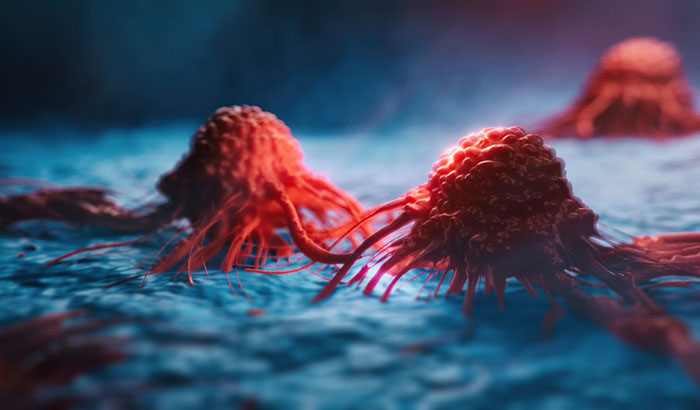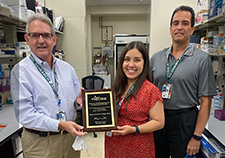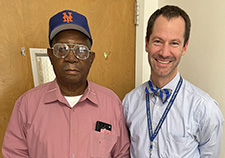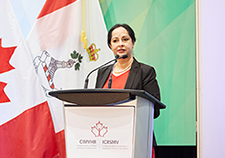Office of Research & Development |
 |


Neoantigens help direct the body’s natural immune response by tagging cancer cells. They can also help vaccines detect and destroy cancer. (Photo for illustrative purposes only: ©Getty Images/koto-feja)
April 21, 2022
By Tamar Nordenberg
For VA Research Communications
"By tagging cancer cells, neoantigens help direct the body's natural immune response, including cancer-fighting T cells."
Telltale proteins called neoantigens can serve as potent weapons in the fight against cancer. VA researchers recently conducted two studies to identify which neoantigens can best harness the power of the body’s immune system.
A team of VA investigators and colleagues conducted two studies focused on neoantigens, unique protein segments that can form in cancer cells because of a mutation in the tumor’s DNA. Neoantigens, which do not exist in healthy cells, can play a starring role in fighting cancer. The proteins can earmark enemy cells and spur the immune system into action, explains VA researcher Dr. Karen Taraszka Hastings. She is a dermatologist with the Phoenix VA Health Care System in Arizona and is principal investigator on both studies.

VA center training the next generation of researchers in blood clots and inflammation

AI to Maximize Treatment for Veterans with Head and Neck Cancer

Veterans help find new cancer treatments

Million Veteran Program director speaks at international forum
VA research assistant Elizabeth S. Borden says neoantigens play an important role in the body’s war on cancer. “By tagging cancer cells, neoantigens help direct the body’s natural immune response—including the cancer-fighting response of the immune system’s T cells—and they can also help vaccines and other immune system-based treatments detect and destroy cancer cells,” she explains. Borden is an M.D./Ph.D. student at the University of Arizona College of Medicine–Phoenix, and is first author on both studies.
In the two VA-supported studies, Hastings and Borden collaborated with colleagues at the University of Arizona who specialize in statistical analysis and evaluation of biological data. Hastings is an associate professor at Arizona State University, with an academic focus on immunobiology.
The team’s neoantigen studies “have the promise of improving health care for Veterans and others with cancer by helping to identify which patients have the cancer types most likely to respond to which immunotherapies,” points out Hastings, who treats many VA patients with melanoma and other skin cancers.
The Frontiers in Oncology article reviewed existing research into the therapeutic potential of different neoantigens. The article details not only current knowledge, but also gaps in understanding. “We hope this review will provide a good starting point and reference for other researchers aiming to improve neoantigen prioritization for applications in cancer immunotherapy,” Borden says.
The literature overview is important because the ability to predict which neoantigens are present in a cancer cell, and which can unleash an immune response, is crucial in cancer treatment, Hastings explains. Knowing whether immunogenic neoantigens are present could help identify patients who may benefit most from a certain therapy. And, for personalized cancer vaccines, knowing which neoantigens are present and can stimulate an immune response is key to generating an effective vaccine.
Some therapies already harness the power of the body’s natural immune response to destroy cancer cells. One such therapy, “immune checkpoint inhibition,” safeguards the ability of the body’s T cells to destroy tumor cells by blocking biological signals that would get in their way. “Immune checkpoint inhibition has revolutionized treatments for many types of cancers by its ability to recognize and destroy tumors,” Borden says.
But Borden emphasizes that not all cancer patients respond to this type of immunotherapy. The team’s other study, NeoScore, aims to identify which neoantigens best trigger an immune response and which patients are most likely to respond to treatment. The study also aims to support the development of new therapies, like personalized cancer vaccines, to treat patients for whom current treatments fall short.
The NeoScore study, published in the Journal of Immunology, examined a long list of characteristics to determine the most essential hallmarks of the power to quash cancer cells. The analysis focused on “MHC class I” neoantigens, a category known to directly elicit an immune response for killing cancer cells.
There is no widespread agreement on the characteristics that make a neoantigen capable of mounting an immune response or capable of stimulating a T-cell response. So, the team set out to assess which characteristics had the most promise. They translated these characteristics into an overall score representing the likelihood a given neoantigen would elicit a T-cell response. The NeoScore rating helps prioritize neoantigens that would be most effective in the development of personalized vaccines.
Demonstrating the effectiveness of the approach, a high NeoScore was strongly associated with improved survival in patients who were treated with immune checkpoint inhibition for melanoma. In contrast, a clinical test that looks at high “tumor mutation burden,” currently used to help physicians decide whether to prescribe immune checkpoint inhibition, showed no such improved survival. “These results suggest that the NeoScore has the potential to be developed and applied to improve therapeutic decision-making for immune checkpoint inhibition and personalized cancer vaccines,” Hastings says.
Moving forward, Hastings’ team is interested in examining MHC class II neoantigens, which are known to play a pivotal role in enhancing the immune response to cancer. This class has been studied less extensively than the MHC class I antigens, and represents “fertile ground for future research,” according to Hastings. The investigator and her research partners are also planning to delve more deeply into how to best apply the NeoScore to predict a patient’s response to immune checkpoint inhibition.
VA Research Currents archives || Sign up for VA Research updates